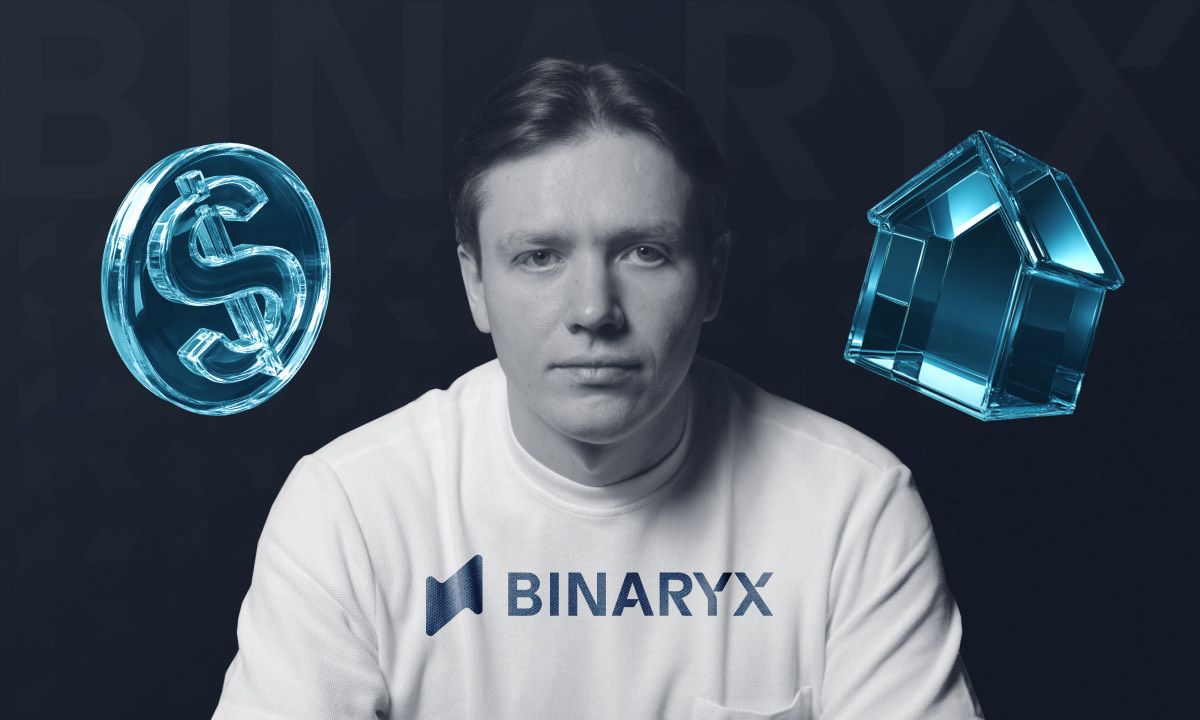
Binaryx CEO Oleg Kurchenko on Why Wall Street Should Fear $4T Tokenized Real Estate
Real estate investing is being rewritten. As blockchain unlocks new financial models, Binaryx CEO Oleg Kurchenko is leading the charge to make real estate globally accessible, liquid, and transparent. Backed by Deloitte’s $4 trillion market forecast by 2035, Binaryx lets anyone invest in property with just $50—no banks, brokers, or bureaucracy required.
Traditional property buying is slow, expensive, and paper-heavy. Tokenization removes middlemen, compresses transaction time from months to minutes, and allows fractional ownership of real estate worldwide. On Binaryx, users can diversify across multiple properties, earn rental income within minutes, and exit positions easily—just like trading stocks.
Beyond investing, Binaryx focuses on education and trust. With 70,000+ users and a growing community across X, Discord, YouTube, Telegram, and Medium, the platform offers hands-on learning, asset transparency, and on-chain proof of ownership. Regulators in markets like the US, UAE, and Switzerland are already setting clear rules, but gaps remain—and bad actors pose a threat if the space isn’t properly secured.
For Kurchenko, the biggest competitor isn’t another crypto exchange—it’s the outdated systems clinging to legacy processes. Most real estate is still managed with spreadsheets and contracts that pre-date the internet. Tokenization doesn’t replace traditional assets; it modernizes access and makes real estate investing as simple as sending an email.
Q: Deloitte expects tokenized real estate to reach $4 trillion by 2035. Is this hype, or is Wall Street actually under threat?
It’s not hype, it’s an overdue wake-up call. Traditional real estate and Wall Street are bloated, slow, and allergic to transparency.
If Wall Street doesn’t adapt, it’ll get quietly replaced by faster, borderless capital markets powered by code.
Q: $4 trillion sounds huge. But what does that actually mean for people?
It means more people will be able to invest in real estate, even if they don’t have a lot of money. Instead of buying a whole apartment, you could own a small piece of a property for as little as $50.
That opens the door for millions of people who were locked out of the market before.
Q: How does Binaryx help people learn about tokenized real estate?
We’re all about being there for each other. We have built a big community with over 70,000 people across X, Discord, YouTube, Telegram, and Medium. Also, we offer detailed guides through our Binaryx Learning Hub, email newsletter, and blog. You can even learn by doing fun quests on the platform.
Our customer service is fast and always happy to help. And we often join conferences to meet people and talk about blockchain and tokenized real estate.
Q: What exactly does tokenization fix in the property-buying process?
Why should buying property feel like a medieval ritual with notaries and months of paperwork?
The current system is slow, expensive, and filled with middlemen — lawyers, banks, agents — each taking a cut and adding friction. And tokenization helps to reduce legal costs, which can be pretty high in property deals.
You get more options to spread your money around — like investing with different developers and management teams — so your risk is lower.
And you can get money from rental properties pretty fast, in just 5 to 40 minutes on Binaryx.
Now you can even earn compound interest, just like with stocks. It’s something new in real estate investing.
Tokenization puts ownership on the blockchain, where transactions can be completed in minutes, not months. It makes real estate liquid, meaning you can buy or sell small portions without waiting for a full sale. And also divisible, so you don’t need $300,000 to invest, just $50.
And it makes it global, so someone in Paris could invest in a property in Bali with the same ease as buying a stock. We’re not just speeding things up, we’re opening the market to the entire world.
Q: What’s the dark side of this $4T dream? What’s not in Deloitte’s report?
The real problem is with the old rules and people in charge. Regulators don’t fully understand how this new system works yet.
More than 10 countries, including the US, UK, UAE, Canada, and Switzerland, already have clear rules for tokenized real estate to protect investors. But if others don’t catch up, we could see confusing rules, project shutdowns, and a lot of legal mess.
Also, there’s a danger of scams, people launching fake real estate tokens with no real value.
Q: Who’s your real competitor? BlackRock? Uniswap? Or is it just inertia?
The real enemy is Excel spreadsheets. I’m serious. Most real estate is still managed in Excel and Word documents. We’re competing with decades of habit.
The biggest problem now is that people just don’t know how blockchain technology works. Tokenization can sound complicated, so it’s difficult for many to trust or even try it.
And also, tokenized assets don’t replace stocks or bonds. They help you add real estate to your portfolio with better liquidity.
Once the mindset shifts, the big players will naturally follow, but for now, it’s the status quo we’re challenging.
Q: What needs to happen to prevent tokenized real estate from becoming just another hype trend?
If we get the infrastructure and regulation right, we can keep the best of crypto liquidity without turning homes into the next meme coin.
This means building trustworthy platforms that ensure transparency, proper asset evaluation, and investor protection. It’s about blending innovation with responsibility to create a market people can rely on.
Q: Who benefits more from tokenized real estate — a 19-year-old in the Netherlands or just some tech guy with five screens and a crypto wallet?
The tech guy might get in early, but the kid gets something even more powerful — access. For the first time, geography won’t limit investment potential. A teenager can own a piece of property in Turkey, collect yield, and build wealth without needing a visa or a trust fund. That’s seismic.
Of course, this only works if we focus on making it easy for anyone to join and open to people everywhere. Otherwise, we’re just building another gated community, just digital this time.
Q: Every gold rush has its scammers. How can we make sure tokenized real estate is safe for everyone?
Regulation will eventually catch up, but that’s not enough. The real answer is radical transparency. Every tokenized asset needs to come with on-chain proof of ownership, valuation history, and risk disclosures.
At Binaryx, we’re building tech that makes every data point auditable by default, not hidden behind PDFs.
And here’s the thing: if a project isn’t honest and clear, the market will shut it down faster than any regulator. Crypto learned the hard way — real estate doesn’t have to.
Q: Let’s play a worst-case scenario. Tokenized real estate fails. What kills it — regulation, tech flaws, or human greed?
All three, but in a very specific order: greed, regulatory overreach, and then infrastructure gaps. If too many bad actors flood the space with rug-pull real estate deals, trust dies early. Then, regulators panic and overcorrect, slapping on rules that suffocate innovation.
If the platforms can’t grow or keep assets safe, people will stop trusting them fast. It won’t be a slow problem, it will fail all at once. That’s why at Binaryx, we focus on building strong technology, helping users, and worry about hype last.
Q: In 2030, what does the average real estate investor look like — and how do they behave differently from today?
The typical real estate investor won’t be a middle-aged man in a suit. It’ll be a 24-year-old woman with a digital wallet. She owns small parts of an apartment in Turkey and a villa in Bali, and she uses both to earn passive income.
Even today, this is already happening. Our platform lets you easily buy small pieces of property, see how much you’re earning, and take out your money whenever you need it.
Q: What’s the big vision for Binaryx? How do you see it standing out from other platforms?
We don’t want to be a short-lived trend. Binaryx wants to be like Amazon or Uber — something people use everywhere.
Not like Vine, which was cool for a moment and then disappeared. We’re building real tools, for real people, with value that lasts.
Q: You’ve said Binaryx wants to be like Amazon, not Vine. That’s a bold analogy. What exactly does that mean in practice?
Vine was cool, but it didn’t last because it wasn’t infrastructure, it was entertainment. Amazon, on the other hand, moves millions without being flashy.
We want Binaryx to be the invisible engine powering global real estate liquidity. That means building APIs, SDKs, legal wrappers, and asset verification tools. We’re not chasing headlines. We’re building the plumbing to make tokenized real estate actually flow, not just make noise.
Q: Why should anyone trust tokenized real estate over traditional buying?
It takes 5 minutes to buy property. Just compare it with how it usually goes, it can drag on for up to 3 months.
With blockchain, you don’t need a lawyer, a bank, or a mountain of paperwork. Everything happens online in a few clicks, and you can sell your shares anytime you want.
Q: Will this help solve the housing crisis, or will it just make it easier for investors to make money?
Tokenization won’t solve the housing crisis by itself. But it can help by bringing in more money to fund new developments.
And if people can start earning from properties they rent or invest in, that gives them more stability and opportunity over time.
Q: How does Binaryx make sure people don’t get scammed?
We check every property before it’s listed and make all the information public. We also work with partners who are legally registered and follow strict rules.
And we’re building tools that help users understand what they’re buying, even if they’re new to investing.
Q: Which countries do you think will adopt tokenization fastest, and which ones will cling to the old ways?
Countries like the UAE, Switzerland, and Singapore will skyrocket, they already live in the future. Everything’s fast, digital, and investor-friendly. They welcome new tech and have clear rules.
Germany and France will resist, they are more careful and slow to change.
The US. is in between — some places are ready, others are still unsure. Miami and Texas see tokenization as a big opportunity. But New York takes forever to say yes to anything that sounds like crypto.
Q: What’s something surprising people don’t realize about tokenized real estate?
People think it’s only for investors. But in the future, renters might be able to earn small pieces of ownership just by paying rent on time.
That means people won’t just be renters anymore, they’ll slowly become owners too, which could change the whole idea of what it means to “own” a home.
Q: What’s the biggest problem you’re facing right now at Binaryx?
A lot of people still don’t know this technology exists, or they don’t trust it yet. Our job is to make it simple, safe, and easy to try.
Once people use it once, they usually stick around.
Q: Some say tokenized real estate is just a bubble waiting to pop. What’s your take?
Bubbles happen when people chase hype without value. What we’re building is infrastructure, not fireworks.
If we keep things clear, follow rules, and focus on real people, this won’t burst like a bubble — it will help change how property investment works. The real danger is rushing in without thinking it through.
Q: And finally, if you had to describe tokenized real estate in one line that could piss off traditional finance, what would it be?
Tokenized real estate is Wall Street without the suits — just property investing made simple and open to everyone, not just the rich and powerful.
Conclusion
Tokenized real estate is no longer experimental—it’s inevitable. With Binaryx building the infrastructure to power this shift, the next generation of property owners won’t wear suits or need six-figure capital. They’ll own global real estate through apps, with full control and transparency. Wall Street isn’t just being challenged—it’s being outpaced.



 Bitcoin
Bitcoin  Ethereum
Ethereum  Tether
Tether  XRP
XRP  USDC
USDC  Solana
Solana  TRON
TRON  Lido Staked Ether
Lido Staked Ether  Cardano
Cardano  Avalanche
Avalanche  Toncoin
Toncoin